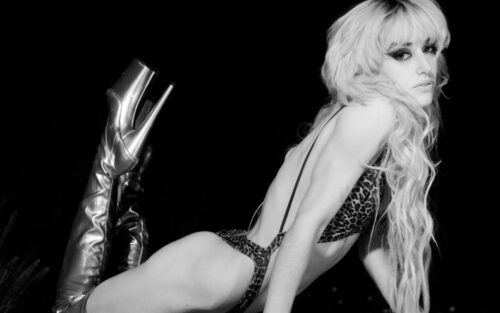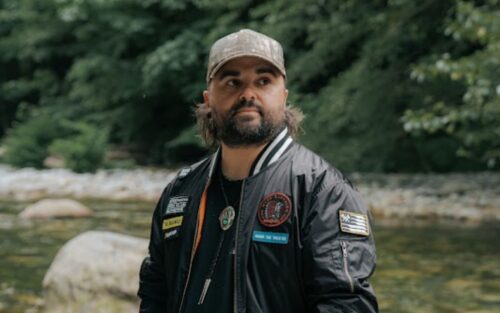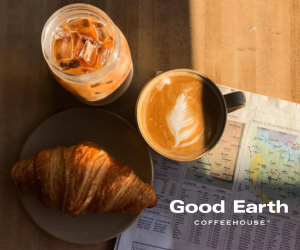BODEGA Continues To Wrestle With Life In The Digital Age
The Brooklyn art punk troupe maps the relationship between ideas and culture in new album, Broken Equipment.
By Brit Williams
Photo by Michael Lavine
- Published on
“We broke up immediately,” he adds. For Hozie, his first impression of the bright lights and buzz of the big city ultimately let him down. “I really thought I would relate to the people I met in the rock scene,” he says. “I was a philosophy student in college, and I was looking for rock and roll intellectuals, people who were equally as enamoured with traditional rock and roll like Chuck Berry and The Beatles, but who also wanted to read philosophy on the weekend.”
After what he says felt like a long search, Hozie found Nikki Belfiglio and the members of his 2013 band Bodega Bay, who he played with for several years before finding new musicality as BODEGA. Together they formed a new troupe of musically inclined intellectuals who he eventually shared his philosophical discourse with at a book club, drawing thematic inspiration for songs through discussion.
BODEGA is a band whose lyrics reference contemporary issues of algorithmic targeting and media gentrification, a theme which carries forward in each of their musical efforts. Their second full-length, Broken Equipment, has been two years in the making and continues along the art-punk trajectory of the band’s debut, Endless Scroll (2018). This time, however, they bring in elements of hip-hop, indie-pop, and classic rock to backdrop their meanderings on the pertinent issues of our time. “One of the goals with BODEGA is to analyze the changes that are happening, not just with technology or culture, but more so with consciousness, and try to shape that. I think that art can literally change consciousness, even if it’s just in one person.”
With this concept in mind, it allowed Hozie to use the philosophically problematic figure of the self to help him navigate the current state of a life in the digital age. Although running through a lot of the music and conceptual framing of Broken Equipment took place pre-pandemic, its theme eerily mirrors the current infrastructure of a world dealing with slews of unresolved trauma. “You understand yourself better when you understand the stimuli you’re thrust upon. So, we kind of wrote with that theme in mind,” he says. “In this technological shift happening now, we are literally becoming androids.”
For Hozie, it seemed impossible not to comment on the age he refers to as the biggest change in mankind’s identity. “I think it’s even a bigger deal than the industrial age or the renaissance.”


“My phone is now a part of my body. The first thing everyone does when they wake up is they immediately go to their phone, as if they’re looking for their other head. It’s an automatic response, it’s not even a choice – it’s just programmed in us now. It’s a storage device, it’s a conduit to the world and it’s teaching us to craft more self-aware personas. We’re living in science fiction.”
Doubling as filmmakers outside of the band, Hozie and Belfiglio exemplify their self-professed motto that “the best critique is self-critique” when discussing the new tracks on the album. Hozie’s songs channel both sides of his personality. This dualism, he calls it, is half romantic, half scientific. “The romantic in me believes that all creative people have to put stock in their own individual thought to stick out from the masts of society, but the other half understands how I am just a product of my historical moment and that all my thoughts are not my own at all.”
‘Thrown’, Hozie admits, is an ode to identity. “It’s me trying to figure out who I am – obviously, a bundle of contradictions. It’s me understanding myself through New York City, through the language of YouTube self-help videos that I watch all the time, through my ex-girlfriend in ‘All Past Lovers.” ‘Seneca the Stoic’, he adds, casts a shadow on his relationship with depression and touring, while ‘How Can I Help YA?’ is about struggling with the ego. Ballad ‘After Jane’, perhaps the most personal song on the album, is written for his late mother.
“Ballads are sort of a lost art in our wheelhouse,” he says. “There was a while there when I thought that I didn’t really want to share this with the world. Nikki (Belfiglio) really pushed me to and I realized I should put it out there because hopefully, someone else can relate to it.”
Hozie co-produced the new album alongside the band’s NYC mixer Bobby Lewis, and took the time in quarantine to learn Logic and ProTools to seize the means of production as best he could. “I am somebody who believes in quantity over quality,” he says, advocating that the old-fashioned music industry model should allow for more instant releases of music, letting the fans live in-sync with the artist while the emotion behind the song is still bubbling at the surface.
“I think rock has matured to such a point that we’re so aware of its legacy that there’s too much of the weight of the past on every new release. Part of pop’s magic is its disposability and how it’s reacting in real-time to what’s happening in the world. Part of me yearns for a more direct relationship between ideas and the culture.”
By Cam Delisle
Just in time for her L.A. Pride debut, the alt-popstar drops the visual for “Versed”—a sweaty anthem that pulses with desire.
By Hannah Harlacher
Through cross-continental collabs and ancestral roots, the Vancouver-based DJ and producer is creating space for shared stories on the dance floor.















